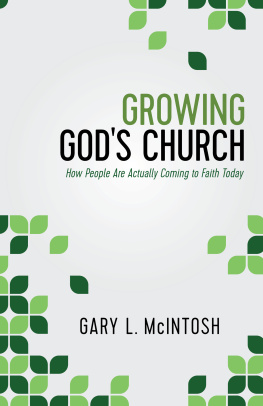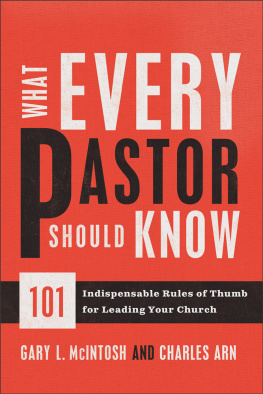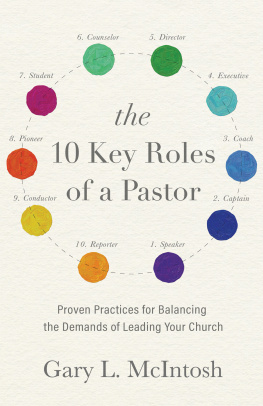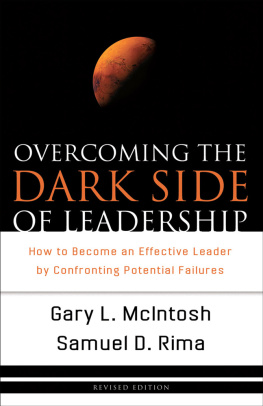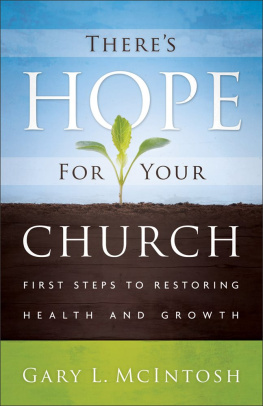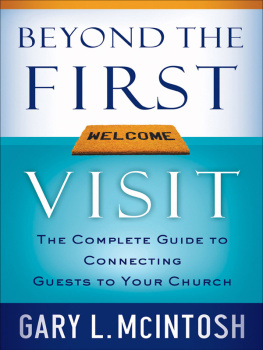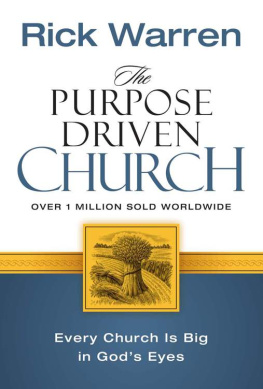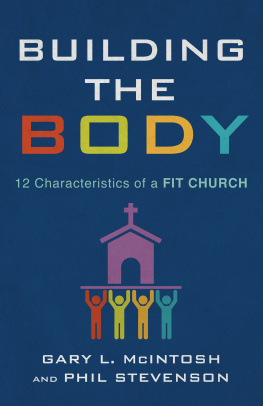Gary L. McIntosh - Growing Gods Church: How People Are Actually Coming to Faith Today
Here you can read online Gary L. McIntosh - Growing Gods Church: How People Are Actually Coming to Faith Today full text of the book (entire story) in english for free. Download pdf and epub, get meaning, cover and reviews about this ebook. year: 2016, publisher: Baker Publishing Group, genre: Religion. Description of the work, (preface) as well as reviews are available. Best literature library LitArk.com created for fans of good reading and offers a wide selection of genres:
Romance novel
Science fiction
Adventure
Detective
Science
History
Home and family
Prose
Art
Politics
Computer
Non-fiction
Religion
Business
Children
Humor
Choose a favorite category and find really read worthwhile books. Enjoy immersion in the world of imagination, feel the emotions of the characters or learn something new for yourself, make an fascinating discovery.
- Book:Growing Gods Church: How People Are Actually Coming to Faith Today
- Author:
- Publisher:Baker Publishing Group
- Genre:
- Year:2016
- Rating:3 / 5
- Favourites:Add to favourites
- Your mark:
- 60
- 1
- 2
- 3
- 4
- 5
Growing Gods Church: How People Are Actually Coming to Faith Today: summary, description and annotation
We offer to read an annotation, description, summary or preface (depends on what the author of the book "Growing Gods Church: How People Are Actually Coming to Faith Today" wrote himself). If you haven't found the necessary information about the book — write in the comments, we will try to find it.
Growing Gods Church: How People Are Actually Coming to Faith Today — read online for free the complete book (whole text) full work
Below is the text of the book, divided by pages. System saving the place of the last page read, allows you to conveniently read the book "Growing Gods Church: How People Are Actually Coming to Faith Today" online for free, without having to search again every time where you left off. Put a bookmark, and you can go to the page where you finished reading at any time.
Font size:
Interval:
Bookmark:

2016 by Gary L. McIntosh
Published by Baker Books
a division of Baker Publishing Group
P.O. Box 6287, Grand Rapids, MI 49516-6287
www.bakerbooks.com
Ebook edition created 2016
All rights reserved. No part of this publication may be reproduced, stored in a retrieval system, or transmitted in any form or by any meansfor example, electronic, photocopy, recordingwithout the prior written permission of the publisher. The only exception is brief quotations in printed reviews.
Library of Congress Cataloging-in-Publication Data is on file at the Library of Congress, Washington, DC.
ISBN 978-1-4934-0157-4
Scripture quotations are from the New American Standard Bible, copyright 1960, 1962, 1963, 1968, 1971, 1972, 1973, 1975, 1977, 1995 by The Lockman Foundation. Used by permission.
Gary McIntosh is one of the leaders in research on growing churches and has made a tremendous contribution in this area. His latest book, Growing Gods Church , explores a number of factors that contribute to growth. Anyone who is interested in knowing about growing churches should read this book. Everyone who is interested in actually working in a growing church needs to read this book.
Elmer L . Towns , cofounder and vice president, Liberty University
Dr. Gary McIntoshs in-depth research project and its practical findings on effective evangelism are a true gift to the kingdom. Every leader with a desire to fulfill the Great Commission should read Growing God s Church as soon as possible. The takeaways are revolutionary for the way we do outreach today. I will definitely be recommending this thoughtful, well-written book to all of my Coaching Networks.
Nelson Searcy , lead pastor, The Journey Church, New York City, founder of www.ChurchLeaderInsights.com, and author of The Renegade Pastor
To George G. Hunter III,
for his over fifty years of pioneering research on how to effectively communicate the gospel of salvation to secular people.
Cover
Title Page
Copyright Page
Endorsements
Dedication
Acknowledgments
Part 1: The Church Today
1. An Old Story Retold
2. What Is Our Mission?
3. What Is Our Priority?
4. What Is Our Role?
5. What Is Our Focus?
6. What Is Our Context?
Part 2: Faith Today
7. Who Led You to Faith in Christ?
8. What Method Most Influenced Your Decision for Christ?
9. Why Did You Begin to Attend Church?
11. What Is the Pastors Role in Evangelism?
Part 3: Evangelism Today
12. Principles of Effective Evangelism
13. Inviting Others to Dine with Jesus
Appendix: Survey Instrument
Notes
Services Available
About the Author
Back Ads
Back Cover
I wish to acknowledge several people or groups of people who made this research project a reality. First, my colleague and friend Michael Anthony, who assisted in the design and early analysis of the data. Second, the numerous pastors who distributed, collected, and returned surveys. Third, the nearly 1,100 persons who took time to complete each survey and share personal information about their coming to faith in Christ and a local church. Fourth, Carol McIntosh for entering the bulk of the raw information into a computer database. Fifth, Laura McIntosh and Gordon Penfold for reading and editing the early manuscript. Sixth, Mary Suggs and Mary Wenger for the final editing and oversight, which brought this project to publication. And seventh, to the late Win Arn for his belief in me as a speaker and writer. To all of these, I say Thank you!
The Church Today
An Old Story Retold
It is an old story that has been told many times before, but like many good stories, it warrants telling once again. Sometime in about the year 30 of the Christian era, a man was sitting at his work when he encountered a person who was about to change his life forever. Matthew, who also went by the name Levi, had painstakingly worked his way up to be the primary tax collector in the area of Capernaum, located in Palestine close to the Sea of Galilee. Matthew worked for the Roman government authorities, but he had grown up in the area and knew the local people and customs well.
The people of Galilee were not wealthy, and the tax revenue that Matthew collected for Herod Antipas was a heavy burden on them. The fact that Matthew added an extra fee to the taxes to provide for his own salary left a bitter taste in the mouths of the people, and most saw him as a traitor to his own people. Indeed, the people of Galilee refused to be friends with Matthew, and so he spent a great deal of time with other tax collectors.
Little did people know, because he never spoke of it, that Matthew felt a deep loneliness and did not like being hated by his own community. Like most people, Matthew wanted to enjoy love and respect from his neighbors and family. Deep in his heart, he longed for a life of meaning. Being a tax gatherer had made him wealthy, he lived in a beautiful home, and his family owned every material item they desired. Still, he was not happy. He longed for inner peace that the great wealth he had amassed could not provide. Most of all, he wanted to be accepted by the people.
Being an educated man, and with his tax booth located in a central place, he easily observed the impact the new teacher was having on the people of Galilee. He had met Jesus once or twice and was surprised to find that Jesus did not criticize or curse him for being a tax collector. Every time Jesus engaged him in conversation, he did so in a respectful and loving manner. Matthew was drawn to Jesus but was cautious, not wanting to open up to just any stranger who came along. The years of abuse he had suffered from the people of Galilee made him cynical about ever having friends, but quietly he hoped that someday he would be accepted and loved.
The new teacher had caught his attention, particularly due to the merciful way he dealt with the most marginalized people in the community. One day Matthew observed Jesus when a man with leprosy came and knelt before him. Most religious teachers of the day screamed out, telling lepers to get away from them because they did not want to make themselves impure. To Matthews astonishment, though, Jesus healed the man of his leprosy. A few days later, Matthew heard talk about how Jesus had healed a centurions servant who lived in Capernaum simply by declaring that the servant was free of disease. He also heard it whispered that Jesus had healed the fisherman Peters mother by simply touching her hand. What was most astonishing was when Matthew saw Jesus drive demons out of people with just his spoken word. These and other actions by Jesus were discussed all over town, and Matthew was beginning to believe that perhaps Jesus had the answers he was seeking.
Then one day as Matthew was seated at his booth collecting taxes, Jesus walked by, stopped for just a moment, looked Matthew squarely in the eyes, and said, Follow me. It was a crazy request. How could he leave his work at a moments notice and simply follow this itinerant preacher? Before he knew it, though, Matthew found himself standing up, walking away from his table, and moving in Jesuss direction. It was really an outrageous thing to do.
Peter had done a similar thing, but Peter could always go back to being a fisherman if it did not work out with Jesus. Matthew, on the other hand, would never be able to go back to being a tax collector. He could never return to his booth. Surely he would suffer the ridicule of the people who already detested him. However, there was something about Jesuss call on his life. Matthew knew deep inside that his life had been changed simply because he had accepted Jesuss invitation to follow.
Font size:
Interval:
Bookmark:
Similar books «Growing Gods Church: How People Are Actually Coming to Faith Today»
Look at similar books to Growing Gods Church: How People Are Actually Coming to Faith Today. We have selected literature similar in name and meaning in the hope of providing readers with more options to find new, interesting, not yet read works.
Discussion, reviews of the book Growing Gods Church: How People Are Actually Coming to Faith Today and just readers' own opinions. Leave your comments, write what you think about the work, its meaning or the main characters. Specify what exactly you liked and what you didn't like, and why you think so.

